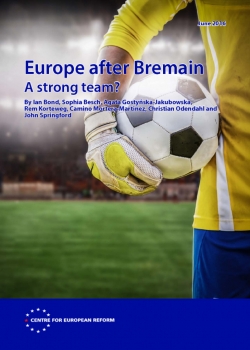
Europe after Bremain: A strong team?
- A British vote to remain in the EU would not solve any of the other problems facing Europe. It would be tempting for EU leaders, including British Prime Minister David Cameron, to go back to crisis management as though nothing had changed.
- That would be a mistake. Backed by a renewed mandate from the British people, Cameron has a chance to set out a more ambitious agenda for the EU. He should show not only that Britain will be "stronger, safer and better off" in the EU, but also that a united EU will be stronger, safer and better off. The EU would benefit from an inspiring and positive vision; the deal with the UK should be the start of a process of change, not the end.
- The UK has traditionally been one of the most proactive member-states in using the EU’s foreign policy machinery to pursue its own and broader European goals. There are many places in the world where the UK and the EU have a stake in peace and prosperity. London should push for the EU to do more, whether in relations with Russia, or in the South China Sea.
- The EU’s neighbourhood to the south and east is a mess. The traditional stabilising instrument, enlargement, is no longer on offer, even to Eastern European countries. Britain should therefore work with other leading member-states to devise comprehensive plans combining security operations, political engagement and free trade to stabilise the neighbourhood.
- Migration and the refugee crisis in the Mediterranean have become a serious threat to the cohesion of the EU. The UK has long argued that the best way to disrupt people smuggling is to resettle refugees direct from regions in conflict; it should set a good example by taking in more refugees from these regions itself. It could also do more to help Schengen countries under pressure, particularly Greece and Italy, to strengthen their border controls.
- Against a background of terrorist attacks in Belgium and France in the last year, the need for EU member-states to work together more effectively on law enforcement and counter-terrorism is clear. Despite its opt-out from much Justice and Home Affairs (JHA) co-operation, the UK has been influential in this area because of its policing and intelligence expertise. Britain could do a lot to help the EU strike the right balance between privacy and security in its treatment of electronic data.
- The EU does not need an army, but Europe needs to strengthen defence co-operation. The UK should encourage this rather than obstruct it. The British government could work with France and other major military powers to develop a bolder EU approach to stabilising countries like Libya that contribute to the refugee crisis. It should work with the European Commission and the European Defence Agency to improve the working of the European defence market and to promote technological innovation.
- The UK needs to stop looking at the proposed energy union through the ideological prism of whether it increases Commission power, and start looking at how Europe’s gas and electricity grids can be integrated better – to increase efficiency and energy security and decrease carbon emissions. It should work with countries in Central and Eastern Europe to encourage diversification of gas supplies, including through completion of the Southern Gas Corridor.
- With elections coming in France and Germany in 2017, the Transatlantic Trade and Investment Partnership (TTIP) is going nowhere in the next year. The UK could still co-ordinate with other free trade advocates in the EU to press for more urgency in trade negotiations with countries including Japan, India and Australia, and in talks on an investment treaty with China.
- The UK should reinvigorate EU efforts to extend the single market into services. It could focus on the most tradable sectors, such as business services or e-commerce. Britain should encourage an ‘opt-in’ EU regulatory system, allowing firms that do business in several member-states to be regulated voluntarily at the EU level; there would be no need then for the Commission to impose one-size-fits-all rules across the EU. The capital markets union, on which the European Commission is working, could benefit from this voluntary approach.
- The UK is not in the eurozone and probably never will be, but as Europe’s largest financial centre it can still have a significant impact, if it re-engages, on the way that the eurozone deals with monetary and fiscal policy, and financial regulation.
- Cameron needs to take the European Parliament more seriously, and advocate closer co-operation between national parliaments and the European Parliament to increase the democratic legitimacy and political accountability of the EU. The UK also needs to get more of its nationals into jobs in the EU institutions, as a way of ensuring indirect influence over the direction of EU policy.
- The internal politics of the Conservative Party will make this a challenging agenda, but Cameron should resist the temptation to go back to business as usual. He needs to show the British people that the UK gains more from working with the EU than against it; and he needs to show EU partners that he has learned the value of teamwork.
Copyright is held by the Centre for European Reform. You may not copy, reproduce, republish or circulate in any way the content from this publication except for your own personal and non-commercial use. Any other use requires the prior written permission of the Centre for European Reform.


Comments
It is evident that EU likes crises because it strengthens some nations compared to others and is taking powers from the states and transferring them to Brussels and mostly Berlin.
For them,the multiple crises are an opportunity for power.Not for real leadership. And an opportunity to giving the rich more money at the expense of the poor.